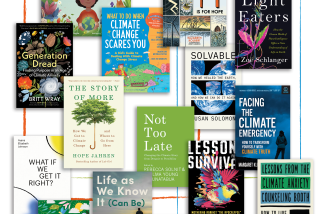After the cataclysm, what?
Shirley Hazzard writes for grown-ups. Her long-awaited new book, âThe Great Fire,â can be counted with âMiddlemarchâ as one of the few novels in English that can hold the attention of an adult without recourse to comedy, freakish plot turns or sentimentality. It is also a classic romance so cleverly embedded in a work of clear-eyed postwar sagacity that readers will not realize until halfway through that they are rooting for a pair of ill-starred lovers who might have stepped off a Renaissance stage.
The girl, Helen Driscoll, is 17, the well-read daughter
of a high-ranking, uncongenial Australian officer assigned to a post near Hiroshima in the years just after the atomic bomb. The boy is no boy at all but a British army major of 32 engaged in mysterious inquiries among the local people and already a source of suspicion. Before Maj. Aldred Leith arrived at the compound, he had heard of the Driscolls -- a harsh and doctrinaire couple, lords of the Occupation -- and their two changeling children, who were curious, intelligent and kind. The die is cast when Leith comes upon Helen reading Edward Gibbonâs history of Rome to her invalid brother, Benedict. Leithâs impressive war record is already known to them. When he treats them as adults, a kind of magic enfolds the trio. They regard him as a ray of light filtering through their familial prison walls. And Leith -- solitary by circumstance, then by habit -- begins to picture an improbable happiness with Helen.
Leith works alone. All we know of his vague project is that he has been sponsored by a high-ranking British official, now dead, and that he hopes âto render consequences of war within an ancient and vanishing society.â It has been a good excuse to wander China for two years, taking notes that he carefully sends into safekeeping.
Now he has arrived near the site of a quarter-million deaths, where access to the bomb site and the survivors is controlled by the Americans. Hazzard provides a few poignant examples of the indignities faced by a vanquished people, but she does not tell us what Leith learns from the humbled Japanese. This is not a novel of war and its aftermath so much as a study of how people act, and how they are acted upon, in the wake of violent disruption. After you shake the chessboard, how will the pieces realign themselves? Will the knight still move in his stately âLâ shape?
How will the lessons of war play themselves out? Leithâs friend Peter Exley, an Australian officer, lies on his cot in the barracks at Hong Kong, realizing âhow much of his soldiering had been spent flat on his back, waiting for war. War had provided a semblance of purpose, reinforced by danger. Danger had been switched off like a stage light, leaving the drab scenery. And there they were at the barracks ... two years into peace and bored to death by it. Each must scratch around now for some kind of compromise and call it destiny.â
Leithâs compromise -- and his deliverance -- is his unlooked-for attraction to Helen, who conspires in his languidly paced pursuit. Both seem wise beyond their years, but Helen still has mileposts of adolescence to endure. Of her first kiss (thankfully, and crucially, not from Leith), Hazzard writes: âThis, then, was the flourished reality: a brute fact, to which loving-kindness was simply, or not even, a preliminary. There had been a screen between her and this. Reality was a wet thick thing alive in her mouth.â Leith returns to England, deciding it best to let Helen grow a bit older, even at the risk of losing her.
As in Hazzardâs best-known novel, âThe Transit of Venus,â characters in âThe Great Fireâ zip back and forth like the tip of a childâs finger across the globe. Even the distance between England and New Zealand (many weeks by ship) seems only symbolic and is collapsed into hardly a mention when Leith finally decides, a year after their separation, to try to fetch his beloved Helen from her fatherâs new posting there. That voyage leaves no impression on him and causes no narrative delay. This prefiguring of air travel -- a commonplace of the world that would be created, in part, by those midcentury cataclysms -- is just one of the ways in which Hazzard seeds her postwar setting with its imagined future: both as rich and as bleak as the world that was destroyed.
But as readers of âThe Transit of Venusâ will remember, the greatest pleasure is her subtle and unexpected prose. Of a robust military wife, she writes that she had âa piping voice, active with falsity.â She describes Leithâs novelist father as a man in whom âan intense, original lode of high feeling had been depleted: he was working, now, from a keen memory of authentic emotion.â Never lyrical for the sake of lyricism, Hazzardâs prose follows the sensible course of her characters -- open to beauty and alert to its dangers. *
More to Read
Sign up for our Book Club newsletter
Get the latest news, events and more from the Los Angeles Times Book Club, and help us get L.A. reading and talking.
You may occasionally receive promotional content from the Los Angeles Times.







